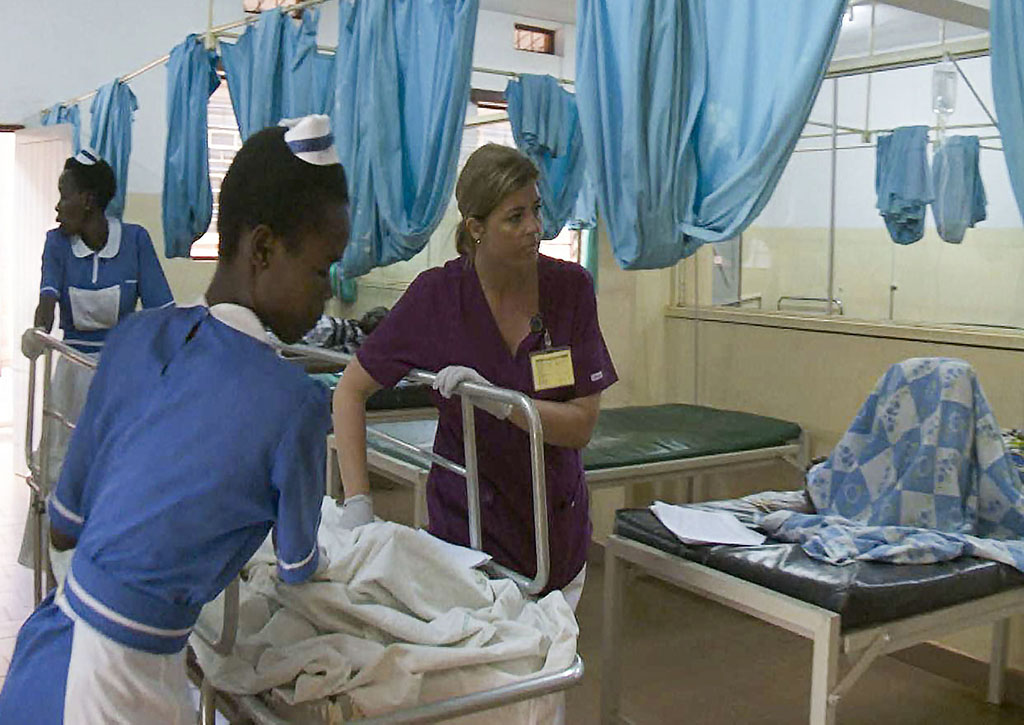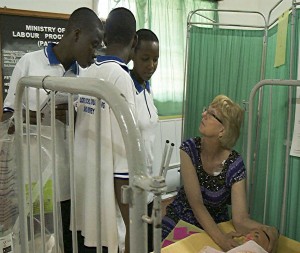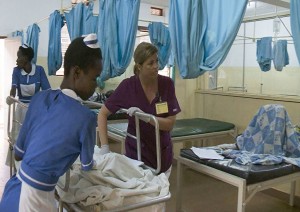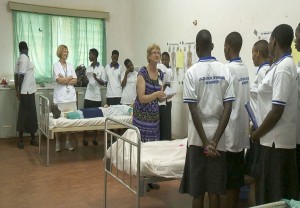
By J.T. Buchheit
News Editor
If you’re not an exchange student, you probably won’t be traveling out of the country for a school activity. But nursing students in the Service-Learning program have an opportunity to embark on a journey few other students ever have the chance to do.
Every year, students and faculty in the program go to Las Pintas, Mexico, to help people in an impoverished area. They participate in many activities to improve the lives of the residents of the area, as well as gain exposure to another culture.
“We partner with El Centro Integral Comunitario, and their mission is to help empower the people in that community to have a better life,” said Mary Smith, the coordinator of the international program. “Whether it’s through education, health, helping them create opportunities to create an income [or] to sustain and improve the quality of their lives.”
Mexico isn’t the only country those in the program go to in order to help others. They also travel to Gulu, Uganda, to provide aid to the people there.
“Starting in 2012, we began taking nursing students and faculty to St. Mary’s Hospital in Gulu,” said Smith. … “That is a three-week cultural immersion experience where we are helping the nursing program with teaching, … and just kind of walking alongside [the Ugandans], finding out what it is they would like for us to help them with. But in the exchange of that, they help us to learn a lot more about culture, cultural sensitivity and awareness [and] how to utilize their skills with very limited resources. So we also benefit richly from that exchange.”
Smith sees helping those in need in other countries to be very important, and she believes it creates growth in the students, faculty and citizens of other nations.
“I see the world as a global world,” said Smith. “There’s needs here in our own backyard, and I’m very cognizant of that … but what’s also important, because we live in a global world, is to help students understand more about culture and more about getting along and spending time with people who are different from ourselves. And I think that’s the best way to build peace, it’s the best way to understand the world that we live in, that we need to develop and survive in.”
One of the nursing students, Becky Koop, recently went on this excursion for the first time. Koop traveled to both Mexico and Uganda in order to gain experience for her future career.
“When I first chose to go into nursing as a career, I always knew that I wanted to use it as a way of helping and serving others,” Koop said. “One of the ways I wanted to do that was through being able to travel to other countries and help people there. Also, I just really like experiencing other cultures and learning from them.”
The activities done in each nation are based around providing help to citizens there, although there are a few differences between the countries in what is done by the organizations and what they help with.
“In Las Pintas, we function as what we call a ‘health brigade,’” said Smith. “We work with volunteers in Las Pintas that volunteer their time and take us into their neighborhoods, and they get people to come, and we do health screenings. Many of them don’t have much access to medical care, primarily because it’s not affordable for them. … Many times we will help people realize that they’re diabetic … so we help them become aware of that and learn how to manage their disease so they can live a healthier life. … We also do a clinic for women’s health while we’re there. We teach women about self-breast exams, and we do cervical cancer screenings.”
While the main focus of the Service-Learning program in Mexico is identifying and treating health problems, the Uganda trip is centered on helping nurses and other medical personnel with treatments.
“We’re there working alongside their nursing faculty, teaching,” Smith said. “Our students are in the classrooms learning along with their students, and they also go into the hospital and share clinical time with them. So they’re really learning a lot about health care in Africa in a developing country. We also teach a program called ‘Helping Babies Breathe,’ which was developed by the World Health Organization to reduce infant mortality and maternal mortality, so we do a lot of teaching with recognizing, right at the moment of birth, what you need to do to help that baby survive.”
Koop found meeting and learning with the Ugandan students to be an enriching experience, and she still stays in contact with some of them.
“My favorite part was the relationships we were able to develop with the students there, because we each had mentors from the schools, so we went with them to the hospital and to class, and I learned a lot from having those mentors and was able to form friendships with them.”
Something Smith and Koop agreed on was the exceptional gratefulness and generosity of the people they helped, both in Mexico and Uganda.
“They would give you anything they have, whether it’s their time or the only chair that they have to offer you to sit on,” said Smith. “And they know who they are. They’re not distracted by material things in their lives, they’re not distracted by lots of technology, so when you’re with them, they’re fully present with you, and I think that’s been powerful with me.”
Although the trips are mainly for students in the nursing program, bilingual students are sometimes able to come as well to work as translators. More information can be found on the Service-Learning pages for Mexico and Uganda, or by contacting Mary Smith at [email protected].
























